
Pickle enthusiasts buy the large jar of the tasty delights, eat them all, and feel just a little sad about pouring all of the leftover liquid goodness down the drain. Luckily, that pickle juice can be reused to create pickled eggs, good for snacks, appetizers, or on a salad. Make pickled eggs by putting boiled eggs in pickle juice and make the most of a refrigerator staple.
Pickling Basics
Pickling uses acid, salt and seasonings to react with foods, preserving them and altering the flavor. Acid inhibits the growth of some bacteria, making foods preserved this way less prone to spoiling. Leftover pickle juice already contains the acid, usually vinegar or beet juice, and seasonings needed for pickling eggs. Pickled eggs stay edible in the refrigerator up to several weeks when properly prepared. Over time, the pickled flavor develops more fully as it seeps into the layers of peeled hard boiled egg.

Choosing Eggs for Pickling
When picking the perfect eggs to pickle, choose small or medium eggs instead of large or jumbo so more will fit in the jar. Also, the pickle juice, or brine, permeates the smaller eggs more quickly, bringing them to their ideal flavor sooner than larger eggs. Fresh eggs keep longer but may be harder to peel once boiled, so allow eggs to age just a few days once they make it home from the store for easier peeling.

Preparing Eggs for Pickling
Fully cook and peel eggs before placing them in the brine for pickling. Place eggs in a saucepan and cover with water. Turn the burner on high and bring the water to a boil quickly then turn off the heat and cover the pan. Cook the eggs in the hot water for 12 to 15 minutes, depending on their size. Place the fully cooked eggs in an ice water bath to cool them quickly. Peel each egg starting at the large end and under cool running water to make it easier.
Adding Boiled Eggs to Pickle Juice
Once the eggs are boiled and peeled, add them to the pickle jar, taking care not to crowd. Each egg should have a cushion of brine surrounding it. Immediately refrigerate the jar of eggs and keep it stored in the refrigerator. Leave the eggs alone for at least two days before tasting them to let them soak up the brine. Eggs achieve more flavor over time, so waiting even longer yields a tastier result.
Cautions
Without a rigorous commercial canning process, pickled eggs made at home can spoil. Store the boiled eggs in pickle juice in the refrigerator at all times and throw out leftovers after four weeks. Make sure eggs are fully cooked hard before placing the in the pickle juice. Soft boiled eggs won't yield the same result and may contain organisms that cause food borne illness.
Related Articles
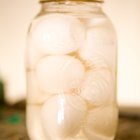
How to Make Brine Pickled Eggs

How to Preserve a Hard Boiled Egg

Can I Make Pickled Eggs by Putting ...
Simple and Delicious Egg Salad Recipe

How to Cook a Hard Boiled Egg With a ...

Shelf Life of Hard Boiled Eggs
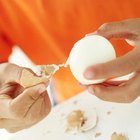
Should I Pierce Eggs Before Boiling?

How to Blanch, Peel, & Freeze Whole ...
6 Make Ahead Breakfast Burritos
Can Deviled Eggs Be Prepared Two Days ...
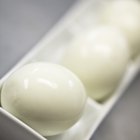
How to Make Salted Egg
Do You Need to Pasteurize When Pickling ...

Can You Hard Boil a Broken Egg?
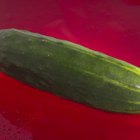
How to Convert Sour Pickles to Sweet ...

How to Pickle Beetroot in Malt Vinegar

How to Make Glow in the Dark Eggs

How to Freeze Raw Eggs

Using a Convection Oven to Cook ...

How to Pickle Brine Sausage
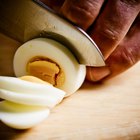
Can You Eat Hard-Boiled Eggs Even ...
References
Resources
Writer Bio
Andrea Lott Haney writes articles and training materials for food industry publications. Having studied foodservice sanitation, nutrition and menu planning at Purdue University, Lott Haney has more than 10 years of experience as a catering and event planner for luxury hotels and currently tours the Midwest as a corporate customer service trainer and consultant.
Photo Credits
George Doyle/Stockbyte/Getty Images